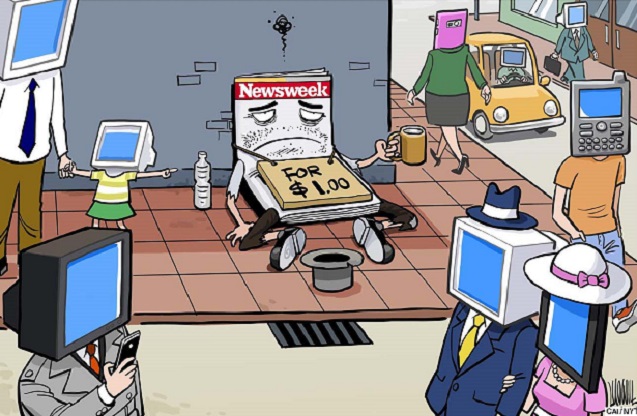
Support justice-driven, accurate and transparent news — make a quick donation to Truthout today!
In an online article for New York magazine, the commentator Jonathan Chait mocked Robert Samuelson for his recent column in The Washington Post lamenting the rise of the Internet. I don’t especially want to pile on, but this is an occasion to say something about my own perceptions of how the Web has changed journalism.
Now, obviously the Internet is causing big commercial problems for news organizations. And that is a real problem; someone does have to do basic reporting, which means that someone else has to pay the bills. But that will have to be the subject of another post one of these days.
What I want to talk about instead is the effect of the Internet on the quality of reporting, which I believe has been overwhelmingly positive. Pundits like Mr. Samuelson seem to long for an age when wise men, perched on their platforms at major news organizations, sifted truth from falsehood and delivered sound judgment to the masses. The trouble is, that age never existed.
I read a lot of economics reporting in the pre-Internet era, and by and large it was terrible. In part this was because the reporters and pundits often knew little about economics — in fact, there was a sort of bias against employing reporters with too much expertise, on the grounds that they wouldn’t be able to relate to the readership. In part it was because there wasn’t an effective mechanism for checking facts and interpretations: a reporter or pundit could say something that everyone who knew anything about the subject realized was all wrong, but they had no way of getting that argument out in real time.
Let me give an example. A couple of years ago Mr. Samuelson dismissed the relevance of John Maynard Keynes in a column because conditions have changed. These days we have lots of debt, whereas, according to Mr. Samuelson, “when Keynes wrote ‘The General Theory of Employment, Interest and Money’ in the mid-1930s, governments in most wealthy nations were relatively small and their debts modest.” My guess is that in the pre-Internet era, an assertion like that would simply have sat there; economists would complain about it in the coffee room, but that would be it. In this case, however, the whole econoblogosphere immediately pounced, pointing out that Britain’s ratio of debt to gross domestic product in the 1930s was actually much higher than it is today. (New York Times policy, by the way, would have called for a formal correction. Oh well.)
The point is that, as opposed to that idealized picture of the way things used to be, in fact real journalists benefit from the ability of knowledgeable nonjournalists to get their knowledge out there, fast. It’s true that there’s a lot of misinformation out there on the Web, but is it any worse than the misinformation people used to get from other sources? I don’t think so. The Internet has also had another, subtler positive effect: newspapers now have a much better idea of what their readers actually care about. In the not-so-good old days, my sense is that management believed that the things that interested Beltway insiders were also the things that interested their wider readership.
Reporters and pundits who cultivated contacts and breathlessly reported the latest twists and turns in the Senator Bomfog scandal were considered stars. But now we have real metrics. Most-emailed and most-viewed lists are highly imperfect, and you certainly wouldn’t want to let them dictate the whole direction of the paper. Otherwise The New York Times would be entirely devoted to articles about food and how to use animal training techniques on your husband. But the availability of these metrics has shaken up the insularity of the industry, and that’s all to the good.
Finally, let me just say that, leaving the news organizations to one side, the truth is that we’re living in a golden age of economic discourse. Yes, there’s a lot of really bad stuff out there, some of it from people with big reputations — but then the loose relationship between reputations and the quality of analysis is something we’re learning about now. And the amount of good stuff — stuff delivered in real time, on blogs open to anyone who wants to read it rather than in the pages of economics journals with a few thousand readers at most — is amazing. When it comes to useful economic analysis, these are the good old days.
Matching Opportunity Extended: Please support Truthout today!
Our end-of-year fundraiser is over, but our donation matching opportunity has been extended! All donations to Truthout will be matched dollar for dollar for a limited time.
Your one-time gift today will be matched immediately. Your monthly donation will be matched for the whole first year, doubling your impact.
This matching gift comes at a critical time. As Trump attempts to silence dissenting voices and oppositional nonprofits, reader support is our best defense against the right-wing agenda.
Help Truthout confront Trump’s fascism in 2026, and have your donation matched now!